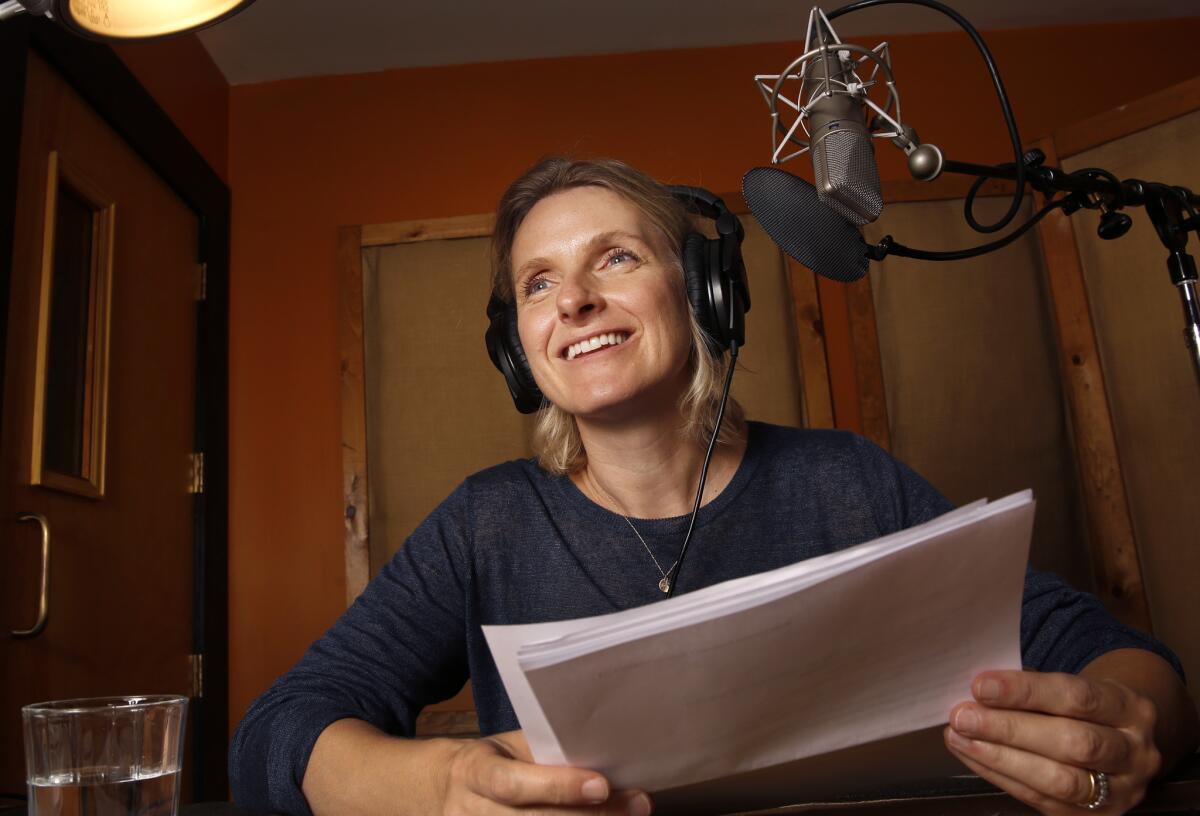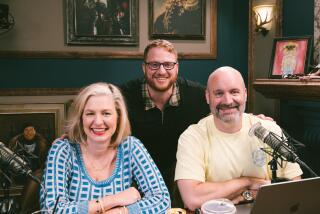‘Eat, Pray, Love’ author Elizabeth Gilbert joins pantheon of literary podcasters

Bestselling author Elizabeth Gilbert (‘Eat, Pray, Love’) prepares for the recording of her new podcast about creativity.
Will Elizabeth Gilbert be the Dr. Laura of book podcasts?
The author best known for her memoir “Eat, Pray, Love” stormed the iTunes charts earlier this month when, with little fanfare, she launched an advice podcast. In 24 hours, Gilbert’s “Magic Lessons” climbed to the No. 2 podcast position on iTunes overall, ahead of every radio show you’ve ever heard of and thousands of podcasts you haven’t, downloaded and streamed more in real time than everything but “This American Life.”
The podcast was meant to be a prelude to “Big Magic,” Gilbert’s upcoming book about the creative process. That book, however, is still a long way off (Riverhead publishes it Sept. 22) and the podcast has become its own creative enterprise.
“What I love is conversation, so it was my idea to make it a coaching podcast to help people with creative obstacles, which turned out to be very satisfying and very moving,” Gilbert explains via Skype from her home office in New Jersey. In the podcast’s first episode Gilbert advises a blocked, novice writer wrestling with issues around family; in the second she discusses those dilemmas with Cheryl Strayed, author of the bestselling memoir “Wild.”
Strayed is another of the major literary figures who have entered the podcast arena. Since the start of 2015 she’s been hosting “Dear Sugar,” a love advice podcast produced by WBUR in Boston with writer Steve Almond. National Book Award winner Sherman Alexie and bestselling novelist Jess Walter are also recent entrants on the scene: Old friends from Spokane, Wash., they read new works, dispense writing advice and share jokes on their podcast, “A Tiny Sense of Accomplishment.”
“We started by saying: We have these great conversations, you can listen in,” Walter says. But they came to understand, as they received emails from writers and teachers, that the podcast audience was connecting with their personal histories too. “The things Sherman and I have in common — we don’t come from New York or L.A., neither of us has an MFA, and we both have been making a living as writers since we were 19 or 20 — in a way we’re almost like throwbacks. You’re not supposed to have a writing career the way either of us have.”
In their podcast, they wind up providing an example, Walter says with typical wry humor, of “two middle-aged guys living the creative lifestyle and trying to manage that with being fathers and dying men.”
Podcasting has been around for 10 years; local long-running podcasts focused on books include “Literary Disco” with writers Tod Goldberg, Julia Pistell and Rider Strong and the “Otherppl” with Brad Listi.
The medium hit a watershed moment this fall when President Obama’s motorcade wound through Highland Park so he could sit down for an interview in Marc Maron’s garage. The comedian hosts the popular long-form podcast “WTF”; his combination of professionalism (he had a radio show on Air America) and enthusiastic DIY spirit (the studio remains in his garage) is endemic to the form.
From that combination of DIY and ambition have also grown podcast networks: Nerdist, which focuses on geek-gone-mainstream culture; Infinite Guest, which includes Alexie and Walter’s show; Radiotopia from the Public Radio Exchange; and Jesse Thorn’s L.A.-based Maximum Fun Network, which produces 20 shows, including the public radio show “Bullseye” and Gilbert’s “Magic Lessons.”
“Expertise is always an essential quality in a host,” Thorn says. “Whether you think of Dr. Laura or the ‘Car Talk’ guys, what makes them so compelling is expertise, telling people what to do.”
When Oprah brought Gilbert on her show in 2007 to talk about “Eat, Pray, Love,” the book became first a bestseller and then a cultural phenomenon. Afterward, Gilbert struggled with doubt and creativity, something she discussed in a TED Talk that has been watched more than 10 million times.
Gilbert’s expertise, in her podcast, is overcoming creative blocks — but with her own twist. “Liz decided basically that her format is asking people,” Thorn says. “She has a legitimate insight into things that comes from a place of modesty, which I think is rare. Her approach to life is to ask questions first.”
She engages with her audience with a rare enthusiasm. “I have the soul of a passionate, devoted writer, but I have the personality of an airline stewardess,” Gilbert says, laughing. “I do not in any way have what we think of as the stereotypical artistic temperament. It is necessary for me to be alone in a room in order to write books, but I don’t even cease conversation when I’m alone in a room. I’m speaking the entire time” — she gestures as if words are pouring out of her mouth — “I’m speaking to my characters, I’m speaking to the book.... I like conversation, and my answer to any problem is always in conversation.”
One of her regular conversations is with fans: Every day she interacts with them on Facebook, where she has 466,000 followers.
“What we’re seeing are people that have passionate audiences already are likely to succeed with a podcast, something that promises a deeper connection,” says Tom Webster, vice president of strategy at the firm Edison Research. Gilbert’s podcast, he explains, offers “a deeper, more intimate relationship with Elizabeth Gilbert than you could gain simply by reading her books.”
Intimacy is built into the podcast form. Most podcasts are focused on a voice or voices sharing a narrative; they are often listened to alone or consumed individually, via headphones, while in a public space. Walter imagines his listeners as “creative people who are also at that moment by themselves with headphones on, on the subway or sitting in their kitchen after having fed the kids dinner, that quiet moment when you’re thinking about art, and you’re thinking about how it relates to you as a person, to your life.”
That creative conundrum is exactly what Gilbert plans to address. “I meet people who want to be doing interesting and creative things and they’re stuck,” she says. “Women especially seem to feel they need a permission slip from the principal’s office before they’re allowed to do anything, and I’m so happy to just be constantly writing those permission slips for everybody.
“I’m the hall monitor: You have a pass and you have a pass and you have a pass,” she says, handing out imaginary passes. “I’m very happy to have that be my job, or one of my jobs.”
Will the podcast carry on after the book comes out? So far Riverhead will confirm only 12 episodes, but Gilbert is leaving the possibility open.
“It’s a format that can certainly continue. Look, it’s not like anyone’s running out of creative obstacles,” she says, laughing. “When I saw the reaction of people really seeming to enjoy it, I thought, maybe I can do this.”
ALSO:
Discovering the screenplay of Joan Didion’s ‘Play It As It Lays’
Man Booker Prize announces 2015 longlist; SoCal author Laila Lalami is a contender
‘Letters’ inscribes a grand love affair with words between Macdonald and Welty
More to Read
Sign up for our Book Club newsletter
Get the latest news, events and more from the Los Angeles Times Book Club, and help us get L.A. reading and talking.
You may occasionally receive promotional content from the Los Angeles Times.








